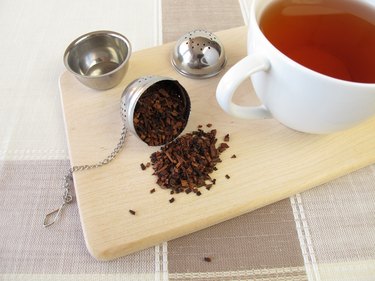
Honeybush tea is a beverage derived from plants in the Cyclopia family, and is regarded for its potential impact on health. The beverage is sweet tasting and has a history of use as a folk remedy, with recent scientific evidence supporting some the tea's purported effects. Regular consumption of the tea is associated with several long-term and short-term health benefits, making it an excellent alternative tea choice.
Improves the Immune System
Video of the Day
Honeybush tea is a natural source of many antioxidants, including major phenolic compounds. Phenolic compounds play a significant role in protecting the immune system from oxidative stress, which could damage cells, according to a 2013 review published in "Nutrients." Phenolic compounds also modulate the immune system, which helps the body's natural defenses against infections. This may be responsible for the belief that honeybush tea is effective in relieving colds, influenza and other diseases.
Video of the Day
Protects You From Inflammatory Diseases
Evidence also exists that the phenolic compounds in honeybush tea are able to reduce inflammation and prevent the development of chronic inflammatory diseases. Phenolic compounds have a direct effect on down-regulating the body's inflammatory response, as demonstrated in inflamed intestinal cells similar to those seen in inflammatory bowel disease, according to a December 2010 study published in "Chemico-Biological Interactions." This makes honeybush tea effective in providing short-term inflammatory relief as well as helping to prevent or ameliorate inflammatory diseases like IBD or Crohn's disease.
Offers Menopausal Relief With Phytoestrogenic Effects
Honeybush tea has phytoestrogenic properties, making it behave like estrogen in the body, according to a 2006 study by researchers at the University of Stellenbosch. Phytoestrogenic activity, combined with anecdotal evidence, suggests that honeybush tea is effective in relieving menopausal symptoms in women. The phytoestrogenic attributes of the tea may also be useful in protecting the body against osteoporosis, heart disease and certain hormone-related cancers.
Inhibits Tumor Growth
Honeybush tea may also have an effect on the inhibition of tumor growth, reports a June 2005 study published in "Cancer Letters." In the study, mice were subjected to treatment from extracts of green tea, honeybush tea and rooibos tea after being given a tumor promoting agent. Green tea appeared to be the most effective, exhibiting 100 percent tumor growth inhibition, but unprocessed honeybush extract was the second most effective, exhibiting 90 percent tumor growth inhibition. Honeybush tea also significantly protects against certain types of mutagenesis in the liver, states a March 2004 study published in "Mutation Research/Genetic Toxicology and Environmental Mutagenesis."
- Chemico-Biological Interactions: Anti-Inflammatory Effects of Dietary Phenolic Compounds in an in Vitro Model of Inflamed Human Intestinal Epithelium
- Agricultural and Food Chemistry: Phenolic Metabolites From Honeybush Tea (Cyclopia Subternata)
- University of Stellenbosch: Evaluation of the Phytoestrogenic Activity of Honeybush (Cyclopia)
- Mutation Research/Genetic Toxicology and Environmental Mutagenesis: Ex Vivo Modulation of Chemical-Induced Mutagenesis by Subcellular Liver Fractions of Rats Treated With Rooibos (Aspalathus Linearis) Tea, Honeybush (Cyclopia Intermedia) Tea, as Well as Green and Black (Camellia Sinensis) Teas
- Cancer Letters: Inhibition of Tumour Promotion in Mouse Skin by Extracts of Rooibos (Aspalathus Linearis) and Honeybush (Cyclopia Intermedia), Unique South African Herbal Teas
- Nutrients: Modulation of Immune Function by Polyphenols: Possible Contribution of Epigenetic Factors